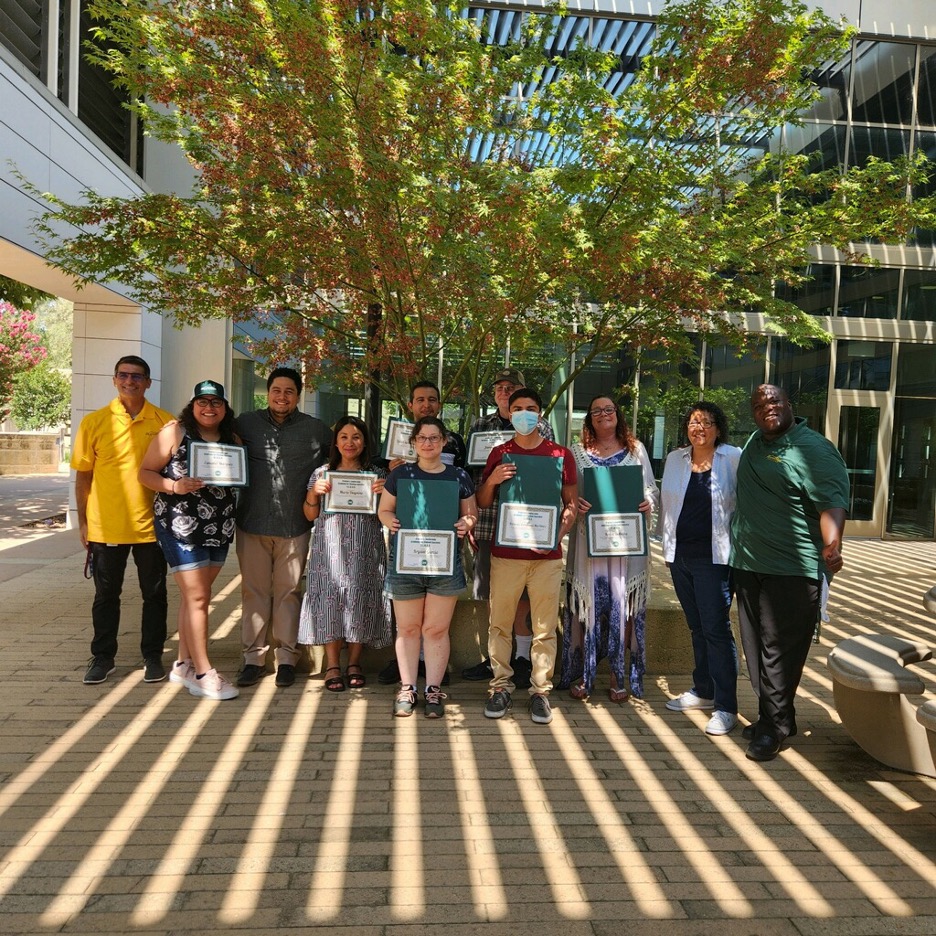Crafton Leadership Academy for Student Success (CLASS)
Submitted By: Mitch Rosin
OnRamp to Employment, Plumas County Adult Education
Website: https://www.craftonhills.edu/adult-education-program/index.php
Type of Practice: Learner Transition
Program Area(s): ABE / ASE, ESL / EL Civics / Citizenship
Region: Inland Empire
Consortia Involved: About Students Regional Consortium, Riverside, Imperial County Adult Education Consortium
The Program of Practice
The Crafton Leadership Academy for Student Success (CLASS) is a comprehensive, five-week summer bridge program designed to support adult school graduates in successfully transitioning to college-level coursework at Crafton Hills College (CHC). CLASS provides a holistic experience that integrates academic instruction, career and college readiness, social-emotional learning, and exposure to postsecondary pathways. Students enroll in COUN-100, a three-unit, CSU-transferable course focused on academic and personal development. The course is supplemented by workshops, university field trips, peer networking, and access to campus resources. Participants receive materials such as CLASS shirts, school supplies, and lunch, promoting a sense of belonging. The program concludes with a celebratory closing ceremony recognizing student achievements. The overview encapsulates the program’s structure, objectives, instructional approach, and student experience from onboarding through completion.
Adult school graduates often face significant barriers transitioning to college, including lack of academic preparation, unfamiliarity with postsecondary systems, and limited exposure to support services. These students may be first-generation college-goers, working adults, or individuals returning to school after an extended break. Without structured guidance and early engagement, many fail to persist through their first year. CLASS was developed in direct response to this problem, aiming to close equity gaps by offering a guided, supportive, and structured introduction to the college experience. It focuses on equipping students with both the academic tools and personal confidence needed to succeed, while fostering early social and institutional connections that increase retention and long-term success.
The Response
CLASS addresses the challenges adult school students face by offering an intentional, student-centered response. The program provides academic instruction through COUN-100, which covers topics such as time management, emotional intelligence, campus navigation, and goal setting. Simultaneously, students participate in real-world learning through university visits, collaborative projects, and tailored workshops covering basic academic and life skills (e.g., writing tips, Google Suite tools, and financial literacy). Each student develops an SEP, submits a FAFSA or CADAA, and is introduced to CHC’s Extended Opportunity Programs and Services (EOPS) and Student Accessibility Services (SAS). These wraparound supports ensure students are academically and administratively ready for the Fall semester. The integration of instruction, social-emotional learning, career exposure, and institutional onboarding forms a cohesive and robust solution to a well-documented need.
The Unique Features of the Program
CLASS blends best practices in bridge programming with locally responsive innovations. It leverages a for-credit course (COUN-100) to provide academic foundation while embedding experiential components that support affective development. Its strength lies in its hybrid approach: offering structured instruction alongside choice-based field trips, cohort-based collaboration, and non-mandatory yet highly encouraged workshops led by subject-matter experts. The program is innovative in its dual-focus on both academic and psychosocial readiness—students develop personal statements, create educational plans, and build relationships with peers and mentors. Tokens such as sashes, shirts, and completion certificates further promote identity development as college students. These evidence-based practices align with research showing that early credit attainment, sense of belonging, and strong peer networks increase persistence among historically underrepresented students.
The Outcome
The CLASS program has produced measurable and observable outcomes. Participating students complete a transferable college course, submit financial aid applications, and generate individualized SEPs, setting the foundation for long-term college success. By the end of the program, students report greater confidence in navigating college systems, understanding educational pathways, and accessing support services. Informal feedback and student testimonials collected during the closing ceremony illustrate improved engagement, increased motivation, and clarity in academic and career goals. Students are also referred to ongoing support programs such as EOPS and SAS, enhancing their academic safety net beyond the summer. Post-program, students are encouraged to meet regularly with counselors and are tracked for persistence and success metrics. These outcomes reflect both short-term gains (college readiness) and long-term indicators of progress (course completion, retention, and transfer readiness). In all, 50 students have completed the program and 100% of graduates have enrolled in Fall courses.
CLASS is both scalable and sustainable within community college-adult school partnerships. Its core components—COUN-100, workshops, field trips, and support services—utilize existing campus infrastructure, making replication cost-effective. The use of existing courses, local universities for field trips, and college personnel for facilitation minimizes startup and operational costs. The program model is modular, allowing for adaptation across different institutional contexts. Scalability is enhanced through potential partnerships with K-12 districts and workforce agencies, who may co-sponsor specific components or refer students. Sustainability is built into institutional planning by aligning CLASS with onboarding goals, equity initiatives, and statewide priorities around adult education and guided pathways. With minor resource investment, CLASS can be institutionalized as a recurring summer program that continuously strengthens the transition pipeline for adult school graduates.

